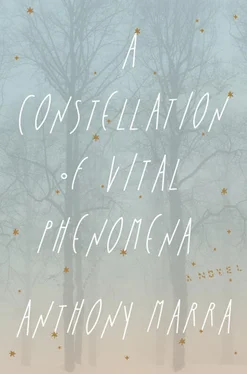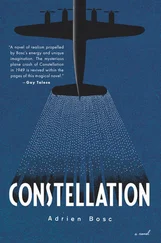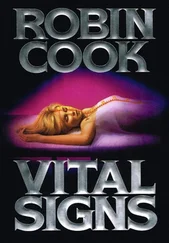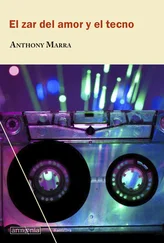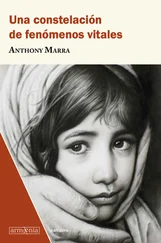“When I was a child, my father brought me an eight-track tape player. Most of the tapes he brought me from the university library were violin concertos and operas and symphonies. Can you imagine anything more boring for a ten-year-old? But it was a wonderful present. I loved it. I enjoyed messing around with the speeds and knobs more than I enjoyed listening to it. If I slowed the speed of the tape, the whine of the violins sank to lower, more ominous pitches. It makes me think of Al-Haaqqa. Are you familiar with verse thirteen? When the trumpet will sound one blast, the earth with the mountains will be uprooted and broken, that is the day when the inevitable event will come to pass, the heavens will fracture and fall, the angels will be on all sides, raising the Throne of the Lord that day, above them . And I used to think that the trumpet blast would come sudden and all consuming. A true blast. An atom bomb. A pinprick in the balloon that is the world. But maybe not. Maybe not. Maybe the trumpet blast has been slowed like an eight-track tape, sounding on the lower frequencies, and maybe the trumpeter’s breath lasts for many years, calling us not in unison, but each at a time.”
“You forgot Al-Haaqqa’s next line,” Akhmed said. A swollen bead of sweat slid down Ramzan’s forehead, following a thin ridge of scar tissue. When Akhmed was in his first year of medical school, he returned one November weekend for the Festival of the Sacrifice. Ramzan, still a teenager then, attempted a midnight liberation of the goat pledged for slaughter, partly because he believed the barbaric custom antithetical to Soviet rationality, but mainly because he wanted to see his pajama-clad father chase it through the night. In the ensuing struggle — Khassan, no fool, lay waiting — the goat, unable to distinguish its liberator from its executioner, grazed Ramzan’s temple with a sharp kick. He became Akhmed’s first patient. As Akhmed stitched a seam in his skin, the usually sullen teenager kept asking for Latin words. Ramzan spoke the words as if to spell them, holding the vowels like grapes between his rounded lips. And Akhmed couldn’t have imagined that the teenager reverentially intoning fellatio , believing it the name of a Roman god, would grow into a man who spoke Chechen as a dead language, selling its words as he had sold firearms and explosives, without knowing their real worth, without regard for who they might kill.
“The next line in Al-Haaqqa?” Ramzan asked uncertainly.
“On that day you will be revealed and nothing of you can be hidden.”
Ula smiled sleepily and rolled onto her side when Akhmed entered the room. He drew little eights on her forearm with his thumb until Ramzan’s voice, addressing no one, faded with the splatter of gravel. In the kitchen he pulled a stool to the wood oven. He wanted to perch over the open oven door and bathe in the flicker until the ghost of this exhausting day disappeared into the chimney pipe. Havaa was safe. She was safe and he would have amputated his own legs for Dokka to know that. Thinking of Dokka and Havaa, he began sobbing. He’d forgotten the swell of pride, how it could overwhelm when least expected, how it could grow back — and how good it was to know there were parts of him a surgical saw couldn’t remove. The flames dissolved in his eyes and through them an ache sounded: laughter. He couldn’t explain it. His face couldn’t express the thing in his chest. He was the most incompetent doctor in Chechnya, the single least distinguished physician to ever graduate Volchansk State University Medical School, and he had saved Havaa’s life. He wiped his eyes on his sleeves, wanting to stay there, perched before the fire, but he had to feed his wife.
“How was your day?” he asked, after Ula swallowed her first bite.
“It was so busy,” she murmured.
“Yours too?”
“I spoke to your father.”
His father, a botanist and collector of pressed flowers, had passed ten years earlier. She had never met him. “He must have come a long way to see you.”
“He did. He looked terrible.”
“And what did you talk about?”
“Your mother,” she said, as if it were nothing. He set the bowl on the floor and lay beside her with his arms folded so their noses and kneecaps nearly touched. Her forehead felt as though she’d spent the day in the sun. Maybe it was summer in the exile his father had returned from, and maybe he’d brought a bit for Ula. She didn’t turn to the window when she inhaled; he kissed her nose for it.
“What did he have to say about my mother?”
She closed her eyes for so long he assumed she’d fallen asleep. “I saw a birthmark,” she finally whispered. “An oval on her stomach.”
Soon she slept. He finished the bowl of rice, disappointed by how little she had eaten, and rinsed it in the pail that had become the kitchen sink. After he stitched shut his pockets — to prevent checkpoint soldiers from planting contraband on him the next day — he brushed his teeth with baking soda and climbed into bed. He wiggled his toes. They felt wonderful there, at the ends of his feet. A question surfaced as he swam to meet Ula in sleep. By morning it would be forgotten, drawn back into dreams, but for a moment it sat there left by the tide. The oval-shaped birthmark on his mother’s stomach. He had never told Ula, yet she knew.

This is about your father. I remember he wrote tracts of pure classification, every idea an — ism, every person an — ist, and when I once criticized him for this reductive habit, he said, “We know the meaning of nothing but the words we use to describe it.” I remember he wanted to teach you to read and write but didn’t know whether to teach you the Cyrillic alphabet (which would be used if the Russians won) or the Latin alphabet (which would be used if the rebels won), and so he taught you the Arabic alphabet instead, and said he would have taught you to read and speak in Japanese if he knew it. I can’t write Arabic. I hope you can read this. I hope there are still people speaking Chechen when you read this. These are stray memories, plucked from the air. But if I closed my eyes and forced myself to find your father, to truly find him, I would find him at his chessboard. In his forty years he lost only three matches. One was to you on your sixth birthday .
I would find him peeling a plum. You haven’t forgotten, have you, how he peeled the skin with a paring knife? A dozen revolutions and the skin came off in a thin, unbroken coil, a meter-long helix. He transformed the skin of that squat little fruit, smaller than your fist, into a measureable length. Then he held the blade to the naked flesh and rotated the plum vertically. One half fell from the other, the cut so clean not even a filament clung to the seed. Pale pink beads dripped to the plate. If Sharik was with me, the dog would contemplate his hands eagerly. But when your father finally let them fall within reach of Sharik’s tongue, he tasted the disappointment of dry skin. Your father wasn’t a graceful man, but he could cut a plum like a jeweler .
He pretended to prefer the skin, and always gave you the flesh. You devoured the slices because you had to wash your hands before touching the chess pieces. It was a beautiful set, hand-carved, purchased by your great-grandfather, before the Revolution, when a postal clerk could afford such intimate craftsmanship. He taught you to play chess, and on your sixth birthday, he let you win. Your father did many things in his forty years. Yet if pressed to recall his finest moment, I would choose to see him in the living room, with you, by the chess set, peeling a plum .
Читать дальше
